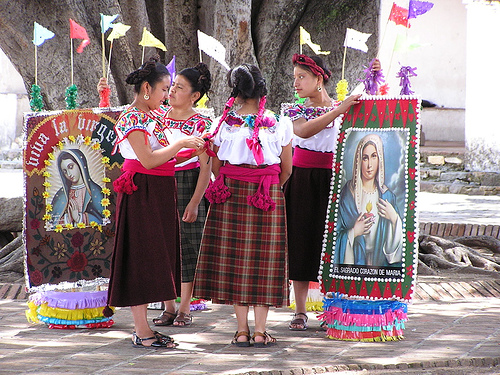Teotitlán del Valle, Mexico
Spend Time in the Place of Gods
By Ron Mader
Latin America Correspondent and the Responsible Travel
Contributing

Traditional weavers displaying their woven rugs. Photo by Ron Mader.
Mexico's Zapotec community of Teotitlán del Valle (elevation: 1,670 meters
or 5,500 feet) is world-famous for production of colorful wool rugs (laadi in Zapotec). Most travelers wish they could spend more time to visit the
weavers in this town in Oaxaca's Central Valley.
Weavers
There are about 150 families who specialize in weaving. There you can see the process from
carding wool to natural dyes to weaving. For details, consult Planeta.com's description of the weavers in Teotitlan del Valle.
Those interested in crafts will find dozens of family workshops open to the
public.
The fabric of choice is wool. This is due to the introduction of sheep in
the valley by Juan López de Zárate in the 1500s.
More than 100 workshops showcase a large selection of handmade products,
including rugs, jackets, ponchos and dresses. A few weavers are reviving the
use of natural dyes including indigo and cochineal and brazilwood.
Designs include traditional Zapotec glyphs as well as imported Navajo art
and reproductions of famous paintings by Picasso and Escher.
Natural World
Teotitlán translates as "Place of the Gods" and the landscape here is
equally formidable.
Lying at the base of the Sierra Juárez, the town is within hiking distance
of interesting places such as El Picacho, Cerro Gie Bets, which translates
as 'Stone Brother' in the local Zapotec language. Permission from the city
government is required to make this hike.
The Cuevita del Pedimento are three small caves a short walk from town. The
site is visited by many to celebrate the New Year.
Bird-watchers flock to this community to see the avine species at the local
dams.
To see the birds, head north a mile to the Piedra Azul Dam at the foothills
of El Picacho. During the rainy months, the Benito Juárez Dam fills to the
east. Winter months (November-March) are the best time to see migratory
birds, including herons and kingfishers.
Cultural Attractions
Across from the town's craft market is one of the finest community museums
in Mexico.
Opened in 1995 Balla Xtee Guedchi Gulal has exhibitions featuring
archaeological finds, crafts and traditional weddings. Signage appears in
English, Spanish and Zapotec. There is a small admission fee and no picture
taking is permitted inside.
The community offers Zapotec language classes. Look for information at the "Let's Preserve Our Language Center" next to the city hall. The community
museums sells a visual dictionary, Diccionario Illustrado en el Zapoteco de
Teotitlán del Valle.
One the major celebrations is the Guyach, simply "dance" in Zapotec that
commemorates the conquest battles between the Spaniards and the Aztecs. This
dance is performed during the Fiesta of the Precious Blood of Christ the
first Wednesday of July (with the proviso that when the first Wednesday is
July 1st or 2nd, festivities are conducted the second Wednesday of the
month). Dancers (danzantes) wear elaborate headdresses fashioned from
painted feathers, which gives the event its name in Spanish, Danza de la
Pluma. The week-long celebration includes carnival rides and a basketball
tournament.
Visiting Teotitlán del Valle
Location: Teotitlán del Valle is 24 kilometers (15 miles) southeast of
Oaxaca City and 4 kilometers west of Santa Ana del Valle and 10 kilometers
west of Tlacolula and east of Tule. See the map below.
Transportation: From Oaxaca City, the Valle del Norte bus line at the
second-class station's Gate #29 offers daily departures (except Sundays)
every hour from 9 am to 9 pm. Taxis and buses can be hailed one block east
of the baseball stadium on Niños Heroes. From Teotitlán, buses leave from
the town market (across from the La Preciosa Sangre Church) from 6am-7pm.
If you are driving from Oaxaca City, head east on Highway 190 and when you
reach Highway 159, head north for four kilometers.
Food: There are a few cozy and authentifc restaurants in town.
Market: The town market is held each morning from 8-10 am across from the
church.
Tips: If you are purchasing a rug, take a measuring tape. If you plan
ahead, measure a space in your home (wall or floor) where you want a rug.
Ron
Mader is a journalist, photographer, and founder of the Planeta.com website, launched in 1994 to explore ecotourism and sustainable tourism around the world.
|
